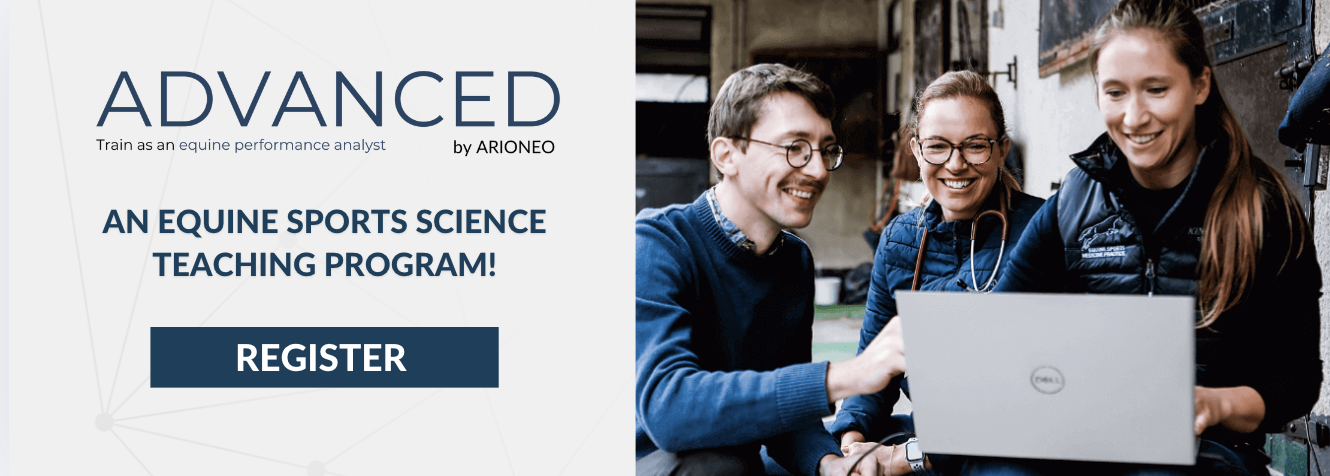Following the first session of our Advanced program, dedicated to data analysis to optimize the performance and health of equine athletes, we had the opportunity to interview an equine veterinarian, Laura Fitzharris.
In this article, Laura reveals how the Advanced training has enriched her veterinary practice and enabled her to integrate data into the monitoring of athlete horses.
Find out how the Advanced training has enabled her to take a more objective approach to monitoring and preventing injury in horses.
Could you briefly introduce yourself?
I’m Laura Fitzharris. I am an equine vet and an American and European specialist in sports medicine and rehabilitation. I have spent the last 12 years working in the UK, but I’m currently based in Australia. Like many vets, I started riding horses at a young age, but I realized that I wasn’t cut out to be a professional rider, so I decided to focus on veterinary medicine instead. It has been a fantastic way to stay connected with horses competing at the top level.
What motivated you to take the Advanced training as a veterinarian?
As a sports medicine specialist, my day-to-day work as a vet involves investigating poor performance and diagnosing and treating a wide range of illnesses and injuries. I’m really passionate about the overall management of equine athletes.
The Advanced training really caught my eye as it offers a great way to use data to keep a close eye on our horses and help prevent injuries before they happen. For me, the idea of using data to improve both their health and performance was a significant motivation.
How did you manage your training regarding your organization with your daily routine?
Really easy! The way the course is provided, along with the ability to access the webinars when you want and when you need to, is really useful. I’m actually lucky enough to be on a sabbatical and training full-time as an athlete myself, playing water polo in Spain.
The course format really gave me the flexibility to fit in the studies around my own training and do everything that I needed to.
Have you ever had the opportunity to work with data before?
Yes. I did my PhD at the University of Bristol, and I worked with a wide range of different types of data while investigating the response of equine respiratory muscles to training in thoroughbred racehorses. Alongside this, we pioneered the use of inspiratory muscle training in horses. We gathered a wide range of data, including ultrasound measurements of muscle size and respiratory strength. I was accustomed to working with data and numbers in Excel beforehand.
Unfortunately, the Equimetre system wasn’t available when I did my PhD, but it would have been amazing to have that kind of technology to enhance our data collection and the information we had on these horses.
Regarding the modules, which courses did you prefer?
That’s a really hard question because I enjoyed all of it, but if I had to choose, learning about the different parameters that the Equimetre measures and the impact of these parameters on both individual and race performance was really insightful for me.
Another favorite module was using data to predict future performance; the speakers gave really practical tips on identifying talent in young horses.
Lastly, the most impactful aspect for my day-to-day work is spotting subtle changes in data to help catch early signs of potential injuries.
For me, this is one of the key areas of the Equimetre.
What is your opinion on the use of data as a veterinarian and what has the Advanced program brought to you?
The Advanced courses really opened my eyes to the additional data we can gather from these sources during training. Being an Ironman triathlete, a water polo player, and a vet, this course really tied together my interests in sports science and veterinary medicine. It has helped me develop my skills in data analysis and incorporate this into my day-to-day vet work. This is really important for helping me monitor and manage horses’ health and performance more accurately, making it truly vital.
Will the training allow you to introduce new practices in your daily veterinary work, especially related to data?
Yeah, definitely. Sometimes without realizing it, data is a crucial part of our daily routine as vets, and the data we get from the Equimetre provides an excellent baseline of information for each horse. This is invaluable for preventing injuries and assessing recovery. For me, the ability to access the ECG recorded during exercise is really useful, alongside the measurements of different locomotive parameters. This information helps keep both vets and trainers well-informed and allows us to make evidence-based decisions, which is crucial for the well-being and peak performance of our athletes.
If you had a message to convey to trainers, what would it be?
I think that the Equimetre is a fantastic tool that complements your existing knowledge and instincts. It offers additional insights that can help make data-backed decisions to optimize training and racing outcomes. That said, it’s important to remember that technology doesn’t replace the invaluable skills of good horsemanship and intuition. I see this as an extra tool in your toolkit that helps you get the best out of every horse.
Would you recommend the Advanced program?
Definitely, the course has provided great insights into how data is collected and how it can be applied. Given my background in performance testing and horses, I found it particularly useful to understand how to assess various fitness, recovery, and locomotion parameters, as well as the different aspects of race suitability. The course offered practical tips and real-world applications for all the data we collected.
I believe this course is essential for anyone using the Equimetre system.
Do you want to describe a bit more about your professional projects and where you’re headed?
I’m focused on offering data analysis services. My goal is to combine the information gathered by the Equimetre with my expertise as a specialist in sports medicine to achieve the best training outcomes for our horses.
Who would you like to collaborate with in the industry?
For me, it’s important to consider both racehorse trainers and veterinarians. My background involves providing second opinions and analysis for horses with poor performance. The new knowledge I’ve gained from using the Equimetre allows me to combine the data collected from these horses with my experience in investigating and treating performance issues in racehorses.
Thank you, Laura, for sharing your journey with us. We look forward to seeing the continued success and advancements that you and all our alumni will bring to the field of equine sports science.
For those interested in learning more about the Advanced program and how it can benefit your career, please visit the Advanced webpage.
Contact:
📞 +44 7773307206
Key Words: advanced, Arioneo Institute, program, training, equine data analyst, horse performance analyst, sport science horse, equine sport science, training program equine, equine learning, equine careers, horse career, equimetre, veterinarian


